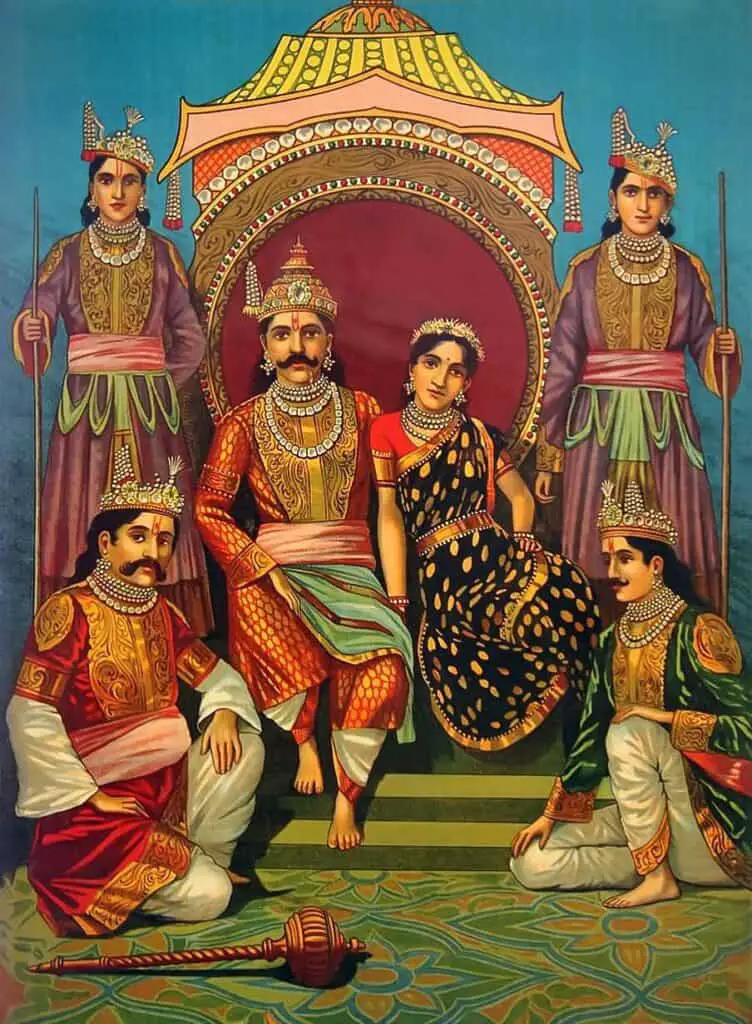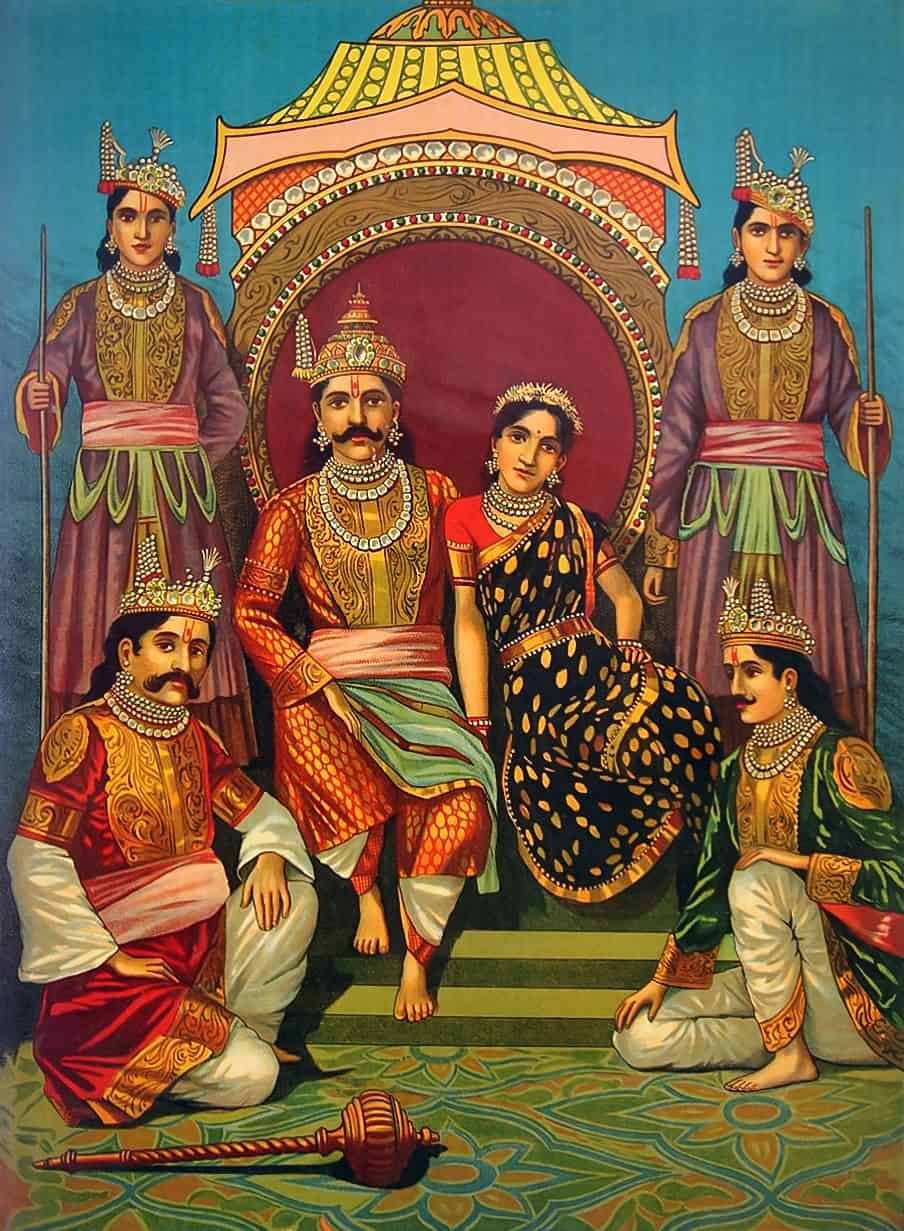Every Indian realizes that Yudhisthira loses everything – his realm, his siblings, himself, and surprisingly his wife, Draupadi during the epic round of dice in the Mahabharata. Duryodhana at that point orders Draupadi to be present in front of him.
When the messenger enters Drapadi’s chamber and requests that she be available in the gathering after the brutal toss of fate. She sends him back with the inquiry “Who did you lose first, yourself or me?”. It was a lawful inquiry by then. In any case, later, she transforms it into an ethical inquiry in the gathering “Is it right or reasonable that a lady, not to mention a sovereign, become a slave since her husband marked her in a betting game ?”

Significance of the question
Even though the legitimate viewpoint resonated totally, the ethical one missed the mark in one perspective – If she could be succeeded at a challenge, so could she be lost, taking into comprehension the predominant traditions of those times. But a woman who could tolerate upping and pose this inquiry even with critical difficulty showed courage, clear thinking, and a will to protect her respect at any expense. It could just highlight a characteristic of strength regardless of anything else.
Hence, it came as something unexpected when I read an extraordinary understanding by Iravati Karve, of the same occurrence. Citing from her book, she says.
“Draupadi’s inquiry was not just absurd, it was awful. Regardless of what answer was given, her position was desperate. If Bhishma disclosed to her that her better half’s privileges over her didn’t stop, that even though he turned into a slave, she was in his force and he reserved the option to stake her, her bondage would have been affirmed. On the off chance that Bhishma had contended that given her servitude, her better half had no more rights over her, at that point her situation would have been genuinely pitiable. She had committed numerous errors in her day-to-day existence that were excusable, yet by grandstanding before the entire get-together, she had placed Dharma into difficulty and offended him. Though she was just a youthful lady of the house, she had spoken in a gathering of men, something she ought to have realized she should not do. Over or more, to imagine that she could comprehend questions that confounded her seniors – that was reprehensible haughtiness.”
She further embraces that as opposed to squabbling over the legitimate details like a woman savant, she ought to have shouted out for conventionality and pity for the sake of the Kshatriya code. Had she done so maybe things would not have gone up until now?
Was the question asked by Draupadi legit?
There are some clear focuses which struck me – Draupadi had the guts to talk in a gathering of men and seniors who may have been more educated than her yet who were likewise set up by then of time, to be quiet observers to her embarrassment. To think that at a snapshot of misfortune, for example, this, a lady would have the ability to act better than everyone else as opposed to zeroing in on utilizing all weapons nearby to protect herself, is additionally projecting an unreasonable slander on her. Though there are chauvinist undertones and it has large amounts of extremely numerous male-centric translations for my loving, I needed to recognize there are features that are intriguing and merit additional thought.
Even with misfortune, which one should an individual depend on – Courage or Practicality? Is courage; which is ensured to lead one to disappointment, just bogus swagger. Is common sense which directs an individual to seem powerless and stoop, more beneficial if it ensures success. Will the ‘achievement’ procured thus be without disgrace.
Ordinarily, there are sufficient and more cases, wherein this inquiry discovers its way into cognizant ideas. There are incalculable instances of survivors of assault, some who lose their lives too and some who luckily make due to tell their story. In those obscured back streets and corners, when dread strikes, the topic of mental fortitude versus reasonableness would frequent the individual who faces it. As far as we might be aware, their decision might not have made a difference and influenced their definitive destiny, yet once more, it could have.
On verifiable occasions, there have been sufficient stories of boldness and fearlessness. The narrative of Chittorgarh merits recalling in this context. Though the ladies forfeited their lives for saving their honor, a thought which can be questioned in the current world setting, it’s an account of fortitude regardless. Was it an account of achievement or disappointment or would it be too credulous to even consider organizing it so narrowly. In the present setting, there was an instance of a lady assaulted at a Bangalore ATM. The way that she opposed a cleaver using man and wouldn’t give up the cash was practically funny to me. Being commonsense was an unmistakable champ there. In any case, there are more bloody instances of assault which on occasion lead to killing, some of whom deliver the inquiry – could the casualty have saved herself by being pragmatic.
The significance of Draupadi’s inquiry would discover no pertinence for a group of people who do not have the will and the ability to show up at the privileged answer. The actuality that she posed the inquiry additionally shows that she rested confidence in their ethical dharma and their arrangement of administration even though her confidence subsequently ended up being misplaced. In the present world, there will be no help from above when a lady is being uncovered. It will be totally up to the lady to keep her brains about herself and sort out the solution to Draupadi’s quandary.
Yudhishthir actions were not up to his will
After Yudhishthir and his siblings were crushed, Draupadi posed an inquiry. Regardless of whether Yudhishtar initially lost himself in the game or lost me?
Allow us to look at this scene cautiously and the episodes happened in an arrangement. Yudhishtar lost his 4 siblings in the wake of marking them in the dice game. At long last, he marked himself and he excessively lost to Kauravas. Here there was a little respite. Yudhishtar turned into a worker to Kauravas right now. Workers have no other choice but to follow Master’s orders. Kauravas were glad that Yudhishtar lost the game. At this stage, Sakuni recalled that Draupadi was additionally there to be marked in the game and he requested Yudhishtar to do as such.
It is appropriate to note here that Yudhishtar had effectively become a worker and according to his Master’s order, he marked Draupadi.
He just followed his Master’s order. Kauravas embarrassed Draupadi to the center in the open court. There is no compelling reason to expound on this scene. Presently Kauravas collected a pile of transgression by embarrassing Draupadi and thus, the whole Kaurava group died in the last conflict.
Conclusion
Draupadi’s question was justified as she asked a legit question. The question was whether Yudhisthira lost her or himself first and in this case, the actions of Yudhisthira were not under his control as he lost himself so he had to do as he was ordered to do.

